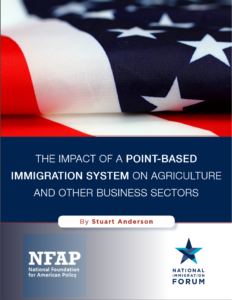The Impact of a Point-Based Immigration System on Agriculture and Other Business Sectors
By Stuart Anderson
National Foundation for American Policy
Abstract
America’s tradition as a nation of immigrants is governed by laws. Today’s immigration laws aim to balance the needs of employers seeking workers and U.S. citizens reuniting with close relatives. Recently, some elected officeholders have advocated changing those laws to significantly reduce legal immigration, eliminate family visa categories, and introduce a point system to replace employer-sponsored visa categories.
The impact of such a change and the current debate over legal immigration carry profound implications for what kind of nation we will be and whether our economy will be growing, diverse and vibrant or stagnant and closed to outsiders. The evidence indicates that reducing legal immigration and eliminating family and other immigration categories will not increase wages for U.S. workers. Instead, cutting immigration will reduce U.S. economic growth, since labor force growth, of which immigrants are a vital part, is closely connected to the growth of America’s economy.
Data show the skill level of recent immigrants has been rising and is far higher than many policymakers perceive. The educational achievements of the children of immigrants provide further proof that today’s immigrants and their families are assimilating as did prior generations.
Evidence indicates that America’s separation of executive and legislative powers makes it unlikely that a point system could operate effectively or in a manner similar to those in Canada or Australia, which have parliamentary systems of government and agencies with the authority to make rapid and unilateral changes to a point system when problems arise. That would not be possible under our laws and structure. Moreover, under a point system, as envisioned, U.S. employers would no longer decide which employees are most valued. Instead, admissions would be subject to government-designed criteria. Attempting to institute an immigration system based on awarding points for particular ages, degrees or language ability ignores the contributions of immigrants throughout American history, the diversity of today’s U.S. economy and the need for workers across the skill spectrum in sectors that include agriculture, construction and hospitality, as well as science and technology.
We need to balance our nation’s need for workers who have different skills with family-based immigration. S. 744, bipartisan legislation which passed the U.S. Senate in 2013, thoughtfully pointed in this direction. Our immigration system can be designed to increase the immigration of people with a high level of skills without either eliminating the ability of employers to sponsor individual employees or reducing family immigration. For example, Congress could eliminate the per-country limit for employment-based immigration categories, increase the number of green cards for employment-based immigrants, and additionally could establish a pilot program for an “independent” category of immigrants, such as in Australia, alongside existing family and employment categories. Bipartisan efforts to identify workable solutions like these serve the interests of American workers and their families, helping our economy grow.
Will America remain a nation of immigrants? The results of the coming debate will provide the answer.



